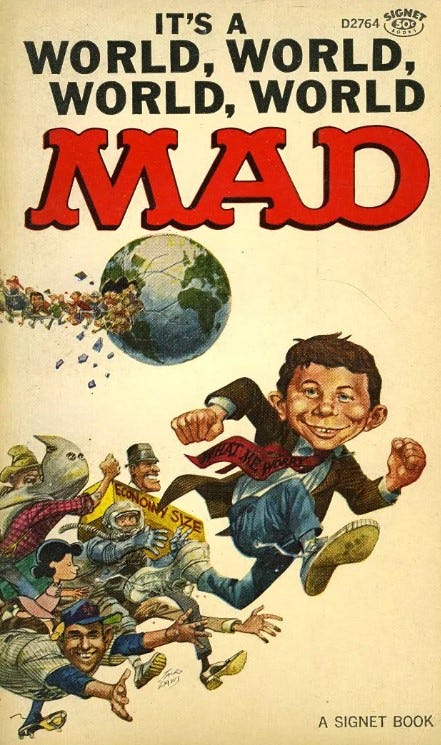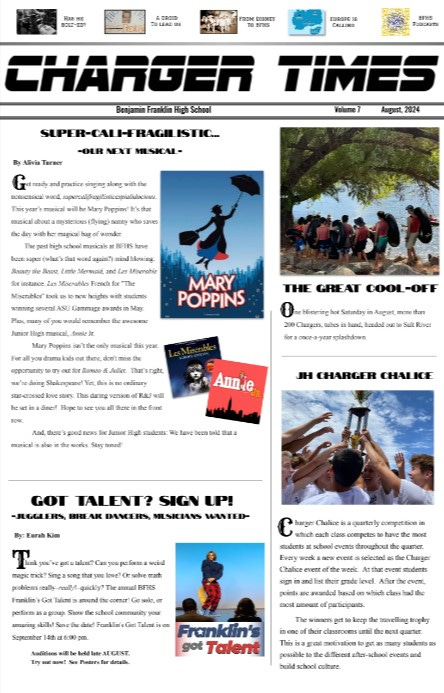Satire. Politics. Small Screens. Bad medicine during election circus.
Don’t you love satire? From Jonathan Swift’s acerbic pen came A Modest Proposal and there’s that classic, George Orwell’s Animal Farm. When I was growing up, many of us found MAD magazine maddeningly irresistible.


Note: Modest Proposal’s full title was A Modest proposal for Preventing the Children of Poor People from Being a Burthen to Their Parents or Country, and for Making Them Beneficial to the Publick.
Satire in the height of election season in many countries, given poor fact checking and AI-generated content, could have dangerous repercussions. Consider this claim:
It was the substance of a tweet by former president, Donald Trump on August 18th, that Taylor Swift endorsed him. It turned out to be a collage of a piece of satire, and AI content—an image of her dressed up like Uncle Sam. (There was also a distorted hand, typical of AI images—a topic I have written on before.)
It gets more risky and, quite frankly, irresponsible, because we are more often than not viewing these AI generated images (if not the stories themselves) on small screens. We are prone to miss the telltale signs of fakery. We will be seeing more of these. Dr. Sanjana Hattotuwa in New Zealand heads a ‘Disinformation Project’ that tracks this kind of occurrence. You should take a look at the work there. Sanjana has also written about the danger of this in Sri Lanka, especially with Facebook et al.
Fake Newspaper. No Apologies.
On a related note, I get these fake newspapers delivered to our mailbox. That itself is a dead giveaway, isn’t it? (When in the history of print has a newspaper landed anywhere else but on our doorstep?) This ‘paper,’ with a masthead calling it the ‘Grand Canyon Times’ is basically a political direct mailer—the kind we toss out in droves.
And in a related matter, Telegram, the messenger app operating out of Dubai was in hot water at the end of August. Its CEO and co-founder, Pavel Durov was arrested in France. The arrest was based on material it carried that violated the country’s child safety policy. (Mark Zuckerberg, I hope you’re taking notes.)
Memes. Why they keep coming.
I am still trying to figure out some political memes. What do you make of the meme around ‘‘Brat” that British singer Charlie XCX flung across our networks? (Perhaps my friends in her birthplace, Cambridge, would shed some light on this?)
What’s a meme? If you’re over fifty, you probably wonder if this meme-ification of everything was something the millennials thrust upon us. Well, I am happy to break it to you that the concept of a ‘meme’ is old as…us! This explanation that might come handy in a trivia contest:
“British evolutionary biologist Richard Dawkins is credited with introducing the term in his 1976 book, The Selfish Gene. In Mr. Dawkins’s original conception, a “meme” was analogous to a “phoneme,” the smallest unit of sound in speech…”
If you like to date that, it was the year “All The Presidents Men” came out. In other words, memes have been around for a long time. Memes, according to some sources, are ‘cultural units of expression’ that spread quickly. They ‘go viral,’ to dredge up a phrase I absolutely despise.
Screens and Teens: More schools join the ban
As more schools come on board, I must give a shout out to Jonathan Haidt, a social psychologist for being the first person to sound the alarm about smart phones and mental health. He continues to speak out at so many venues and on so many platforms that the message is finally reaching the naysayers. (You could listen to him here.)
In the US, the law is sometimes coming down at a state level, as in Pennsylvania, Florida, and Virginia, and Delaware where they are investing in ‘phone pouches’ to lock students phones for the day. The big news seems to be about ‘Yondr’ pouches. These are lockable pouches the school has to purchase, and students use to lock a phone at the start of the day with a magnetic device, and unlock it, likewise at the end of the day.
Quite frankly, I think this is ridiculous. Using one technology to block the other technology causing a problem! The school should be recognizing and solving problem before it starts. In our school, we don’t need ‘pouches’ or even state mandates. We simply educate the parents, and make sure no phone is used during school hours. No ifs, no buts.
I raise this topic in class, since I teach an age group (11-12 year-olds) who tend to be given their first phone. Many tell me this:
Parents say they could only get a phone when they could pay for it.
Parents limit when and for how long a child could use a phone.
Device is taken away if misused, or when grades fall.
They find it so much easy to focus without a phone in their back pocket.
Our Next Newspaper is Out.
As I’ve noted before, we publish a monthly newspaper. In addition to printed copies at school, Charger Times is also digital.
I’ve become a defacto publisher.
It started a long, long time, on an island far far away….In 1984, my room mate, Wilhelm Euphraums and I put together a slim volume of undergraduates poetry in Sri Lanka. We ‘published’ it on a ‘cyclostyle’ machine in the English department, at the University of Peradeniya. Little did I know this bug would live inside me.
We plan to put out a 40th anniversary reprint of An Ear To The Ground in a few months. (By the way, if you never heard of a cyclostyle machine, it was the early duplicating mimeograph. See a picture of one here.)
Thank you for reading this far. I would appreciate any feedback!





